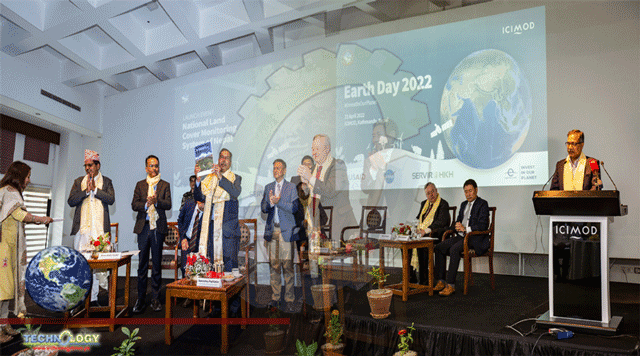The Forest Research and Training Centre (FRTC) is pleased to announce the launch of Nepal’s National Land Cover Monitoring System (NLCMS) to mark Earth Day.

The Forest Research and Training Centre (FRTC) is pleased to announce the launch of Nepal’s National Land Cover Monitoring System (NLCMS) to mark Earth Day. The system uses cloud computing and artificial intelligence to generate consistent data on how much of a region is covered by forests, wetlands, agriculture, and other land and water types, on an annual basis.
The NLCMS will improve reporting on forest cover change and support Nepali lawmakers in making evidence-based policies to improve related land management practices. The FRTC developed the NLCMS with support from SERVIR-HKH, a joint initiative of the United States Agency for International Development (USAID), the National Aeronautics and Space Administration (NASA) and the International Centre for Integrated Mountain Development (ICIMOD).
The Ministry of Forests and Environment (MOFE), Government of Nepal, USAID, and ICIMOD jointly organized the Earth Day event, which was chaired by Biswo Nath Poudel, Vice-Chair of the National Planning Commission and Chair of the ICIMOD Board of Governors.
Speaking on the occasion, Minister for Forests and Environment (MOFE), Ramsahay Prasad Yadav recalled Nepal’s world-leading commitment at COP26 to achieve carbon neutrality by 2045 and become carbon negative thereafter. He added that the MOFE is committed to institutionalising the NLCMS for forestry sector policymaking, planning, and management to help achieve this commitment.
In his keynote address, Michael Michener, Deputy Assistant Administrator of USAID’s Bureau for Resilience and Food Security said that SERVIR has demonstrated the powerful collaboration between NASA and USAID in bringing together science and technology to empower countries in monitoring and responding to their environmental challenges. He said, “We are committed to working with the Government of Nepal to seize the opportunities meaningful climate action creates, and we look forward to continuing our partnership to advance Nepal’s green, resilient and inclusive development.”
Similarly, Pema Gyamtsho, Director General of ICIMOD emphasized that the Hindu Kush Himalaya (HKH) region is a climate hotspot, and that regular monitoring of land cover and land use change is important for land use planning, sustaining ecosystem services, and building resilience to climate change.
During the event, Yam Pokhrel, Director General of FRTC, explained how the NLCMS works. He acknowledged the collaborators for their support in conceptualizing, and developing the software, and incorporating the latest methodologies in land cover mapping.
Nepal’s national forest cover data was last updated in 2015. The NLCMS will make annual data available, classified into 11 specific land cover types. System users can further customise these classifications to generate datasets that comply with national and international reporting requirements.